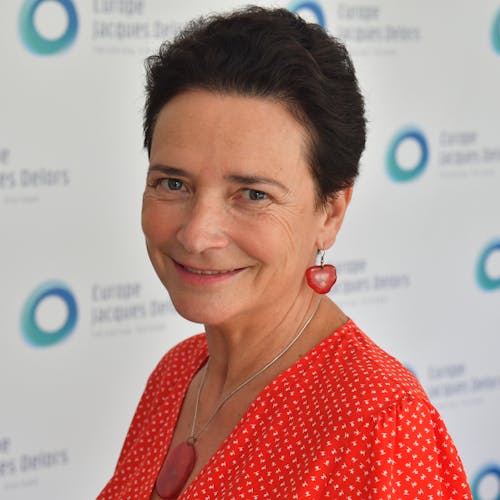Let's phase out fossil fuels!
With Europe Jacques Delors’ team, I took part in the One Planet-Polar Summit, held at the National Museum of Natural History from 8 to 10 November 2023. This summit on the poles and glaciers proved to be a decisive moment for both the polar and glacial scientists and the civil society. The scientific experts delivered an alarming but crucial vision of the ongoing changes in the cryosphere, highlighting their devastating consequences on climate, biodiversity, and human populations. In parallel, I moderated the working sessions of the civil society, which fostered essential reflection, bringing together experts from numerous environmental organisations, and aroused strong emotions when listening to the poignant testimonies of representatives of indigenous peoples.
I had the privilege of facilitating a remarkable collaboration, where more than thirty organisations — including Antarctica2020, which I co-chair — joined forces to formulate policy-oriented recommendations. These recommendations, supported by a constant dialogue with the scientists, emphasised three essential imperatives: the urgent needto limit the temperature rise to 1.5°C, the necessity to effectively protect cryosphere ecosystems, and the crucial importance of involving Indigenous Peoples. I then presented these conclusions to the attending ministers and handed them over to French President Emmanuel Macron, symbolising our collective call for immediate measures.
Hopefully, this summit will serve as a catalyst for broader international commitments in safeguarding the poles and glaciers, including during UNOC3 in Nice in June 2025. The responsibility now rests on leaders to implement these recommendations through decisive actions, and to affirm their commitment to tackling climate change and preserving our planet for future generations.
On the 16th and 17th of November, I had the privilege of attending in the first BlueAfrica Summit in Tangier, co-chaired by Pascal Lamy. This gathering brought together diverse stakeholders united by a singular objective: to chart the course for addressing the pivotal challenges confronting Africa's maritime domain by 2030. In a period dominated by global conversations on ocean governance, the responsible utilization and fair distribution of marine resources, and the pressing matter of food security, it becomes increasingly imperative for the African continent to assert its voice with heightened resonance on the international platform.
As respectively Co-Chair and member of the Africa-Europe Foundation, Pascal Lamy and I actively participated in the High-Level Policymaker Meeting, deliberating on the ways in which the two continents can establish shared priorities in ocean policy and action. Lastly, I had the opportunity to address the assembly during the roundtable discussion focused on the protection and regeneration of coastal areas faced with the deterioration of habitats, the consequences of overfishing and sea level rise.
This Summit marked a new and optimistic approach to the challenges facing the oceans, moving away from the conventional emphasis on problems and focusing instead on proactive and constructive solutions.
Today marks the start of the 28th United Nations Climate Change Conference (COP28) in Dubai, running until the 12 December, and the pressure to agree on ambitious climate action has never been higher. As the world grapples with the unparalleled effects of an ever-warming planet - including record-breaking wildfires, floods, and extreme heat - recent studies indicate that 2023 is on track to become the warmest year on record. Unsurprisingly, the Global Stocktaking Report (GST), which evaluates the implementation progress of the Paris Agreement, unequivocally highlights a substantial gap in current mitigation efforts, warning of a critical need to intensify commitments to limit warming to 1.5 degrees Celsius. These sobering findings serve both as a stark reminder of the urgency of our situation and as a call to action. Tripling renewable energy and doubling energy efficiency by 2030 are strong objectives for which the EU must be praised but they will not suffice. Fossils fuels must be phased out in the next decade. As suggested by the report of the Climate Overshoot Commission, industrialised countries should follow this path while a longer period should be available for poorer developing countries. In Dubai, however, this essential objective is unlikely to be adopted given the opposition of some countries.
COP28 marks a historic milestone with its inaugural "Trade Day" (4 December), recognizing the pivotal role of international trade in climate solutions, as underlined by WTO Director-General, Mrs Ngozi Okonjo-Iweala, in her message to the youth. While trade bears the potential to advance climate and environmental goals, it also presents challenges, especially for vulnerable developing countries. Against this background, EJD has published today a policy paper putting forward development-friendly approaches to climate mitigation policies. Building upon our previous publication (Greening Trade 14), this paper zooms in on two key policy areas: i) carbon pricing and border carbon adjustment mechanisms; and ii) trade in critical raw materials, crucial to achieving decarbonization targets. This paper unveils the intricacies, and inevitable trade-offs, of addressing multiple objectives concurrently, offering practical insights into achieving climate, environmental, and development goals via sustainable international trade policies.
In light of the inclusion of trade matters in the COP28 official programme, this year's conference holds promise for fostering international discussions on the trade-environment-development nexus (the “triangle”) and EJDis thrilled to collaborate with the World Trade Organization for an event on the margins of COP28. If you're attending the Climate Conference in Dubai, join us on December 8th from 13:30 to 14:30h (UTC+4) at the Trade House Pavilion for a high-level panel discussion titled “The Trade, Climate, and Development Triangle: A call to action”, jointly organized with TradeMark Africa and the Government of Barbados (Office of the Prime Minister). Mark your calendars for an insightful dialogue on the trade-environment-development on the global stage.
Geneviève Pons and the EJD team


